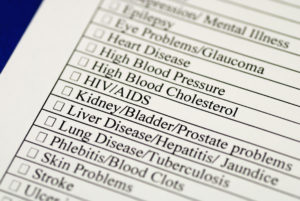You already have new patients fill out a health history form, right? You review that form. That is the routine standard of care in dentistry. But is there more you can do with that “routine task?”
Every communication offers an opportunity to help your patients see the value of health in their lives. With so much to do in a busy practice we all miss opportunities. I like to look at the situations in which we can take advantage of opportunities inherent in something we already do routinely. A new patient health history is a great example. Click here for more on how to avoid missed opportunities in your practice https://maryosborne.com/workshops/step-by-step/
Your practice is unique. Your goals are unique. Your health history should be unique.
What do you want to accomplish with a health history on a new patient?
Is your form a medical ethics instrument designed to make sure you “Do No Harm?” Of course you want to know if they have allergies, or need pre-medication, or take medications that may impact their health or their dental treatment.
Is your form a legal document designed to prove that you asked the right questions? Is it a tool to make the lawyers and the malpractice insurance company happy? Of course you want to protect your practice as much as possible from litigation.
Maybe your Health History form is designed to be a comprehensive review of any physical conditions that might affect your patient’s dental health or their care in your practice. The more you know about their overall health the more you can take that into consideration in recommending treatment. That is a worthy goal.
All the above goals are worthwhile, and all miss opportunities to accomplish more. So much more.
On the written form, and on the follow up questions you ask, you can also:
- Demonstrate your focus on health over disease. Most forms used in dentistry are what I call “Disease Histories” rather than health histories. When all your questions are narrowly focused on disease you set yourself up as a fixer of problems rather than a partner in health. Ask questions about how healthy patients see themselves, or what they do to keep themselves healthy, or what they do to care for themselves. Those questions invite them to see you as a resource and a partner in health, not just a fixer of teeth.
- Raise patients’ awareness about the relationship between dental and general health. When you ask questions about how they sleep at night; if they have headaches or neck pain; what their A1C or blood pressure is, you challenge their assumptions about the disconnect between teeth and the rest of their bodies. I love it when a patient asks why we ask a certain question and what that has to do with dentistry! What a great opportunity to help them expand their perspective on the connection between their oral health and overall health. Sometimes I even raise that for them: “Are you wondering why we ask that question?”
Your follow up questions also demonstrate the thoroughness and scope of your care.
I’ve heard it said that a new patient health history from should be limited to one page because patients don’t like to fill out long forms. I don’t know about that. As a patient myself, what I do know is that I don’t like filling out forms that no one is going to read! Follow up questions show you read their answers and are interested in their responses.
A few thoughtful follow up questions can help you and the patient:
- Go beyond the disease to the patient’s experience of the illness. Simply asking patients about how they manage their diabetes, or how their heart attack has affected their life, can change a routine form into a caring connection in almost no time at all.
- Shed new light on previous dental experiences. Most of us carry stories of previous dental conditions and treatment. If a patient has had a root canal or a tooth extracted, for example, they typically have opinions about why it happened. Asking about how it happened allows them to share whatever appreciation, or anger, or guilt, or self-doubt, or lack of trust they may have. It also invites a dialogue about how you can best make recommendations for them in the future.
- Set the stage for developing a long term plan for health. When we show an interest their unique experience of dentistry, we can help them see choices they have made in the past without blame or shame. They did the best they could at that time given the resources and information they had. We can guide them gently into understanding that they will have choices to make in the future and that we will be there to support them in making those choices.
A Health History can be a routine administrative task or an opportunity to spark a dialogue about patients’ attitudes and beliefs about health. It can help begin a relationship based on mutual respect. It can enliven the patients’ confidence about their ability to choose treatment going forward.
Those are a few of the opportunities that came up for me.
What are some of the opportunities you have tapped into in a “routine health history” in your practice?


Leave a Reply